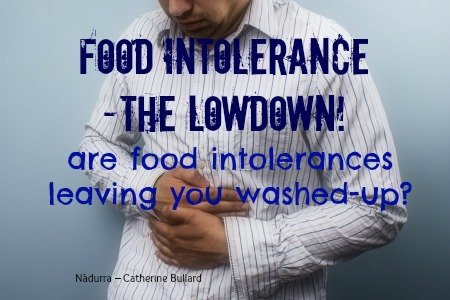The number of people diagnosed with food intolerance have been rising dramatically over the last decade. More and more are becoming aware that they have problems with certain foods. Even more aren’t willing to even consider the possibility that food intolerance may be causing their symptoms. Because the prospect of giving up favourite foods is just too much to contemplate.

The reality for most of these sufferers is their body has an adverse response to specific foods. But many live with the debilitating symptoms of food intolerance for years without anyone able to diagnose their problems. In spite of extensive testing nobody seems able to help them. Often it’s only after eliminating a particular food from their diet that they discover where their problems arise. Sometimes they’re shocked by the extent of damage that particular food caused.
FOOD INTOLERANCE OR FOOD ALLERGY
For many the distinction between allergy, intolerance and sensitivity is not clear, but they are actually very different.
Food Intolerance
Food intolerance involve a completely different response by the body to food allergies. In food allergy the immune system identifies an ingredient as harmful and reacts by creating antibodies. Read more about allergies here.
Food intolerance is limited to the digestive system. It occurs when food is not properly digested and ferments inside the gut. Why this is confusing is that digestive dysfunction often also causes dysfunction in other parts of the body. Therefore symptoms arising from intolerance can appear throughout the body even though they occurred in the gut. They can be quite diverse ranging from depression to weight gain, chronic fatigue, eczema, thrush and many more.
While food allergies are more common amongst children, food intolerances are more prevalent in adults. This is partly due to stress, alcohol, the various medications which all compromise the digestive system. It can also be caused by the decrease in digestive enzyme production as you age.
Food Sensitivity
Food sensitivity is a delayed food allergy and can be particularly difficult to recognize. These are the least predictable reactions. Sometimes you are able to eat a food with no consequences. But at other times symptoms like nausea, cramps or reflux develop. Fructose malabsorption is an example of a sensitivity.
Food Allergies
The onset of problems caused by food intolerance and sensitivity is generally not as rapid as that of allergy. Reactions occur from about thirty minutes to even a few days after the food was eaten. With food allergy reactions happen fast.
While food allergies can produce fatal anaphylactic responses, food intolerances are not life-threatening. But they can lead to many chronic diseases such as thyroid disease, heart disease, diabetes, rheumatoid arthritis, and other autoimmune diseases.
Many with food intolerance are actually eat small amounts of an offending food without too much problem. Dairy foods are a good example of this. According to the Food Intolerance Institute of Australia, in December 2013 75% of the population were intolerant to dairy foods and most of these people were completely unaware of it. This includes milk, yoghurt, cheese and ice cream.
Often it’s the very foods we don’t tolerate well that are the foods we crave the most. Nobody really knows why we crave foods we don’t tolerate although there are a number of theories. As a rule of thumb treat any food you regularly strongly crave as suspicious.
It can take some time before a person is willing to accept that they may have food intolerance. For many it is not until their symptoms become unbearable that they will even consider the possibility. This may be more so if the food is also one they crave.
INTOLERANCE CAN SUDDENLY APPEAR AS AN ADULT
It’s quite common for there to be no apparent problem with foods during childhood and for symptoms to first appear as an adult. Typically, but not always, lactose intolerance symptoms appear in adulthood.
The most common food intolerances are dairy, gluten, wheat, additives, fructose, and yeast. However many other foods including alcohol can be the culprit. Sometimes it will be a whole food group that is the problem, such as the dairy group or nightshade foods – potato, tomato, capsicum, eggplant, chilli and goji. Other times it’s just single foods from different food groups.
Generally, avoiding a food that is not tolerated allows the digestive system a chance to heal. When constant irritation stops the person quickly recovers, feeling happier, more energetic and able to live their life fully.

SYMPTOMS OF FOOD INTOLERANCE
Symptoms caused by food intolerance can be mild or severe, specific or vague. Suspect it is food intolerance if you suffer from persistent symptoms, or ones that occur more than twice a week and aren’t caused by another condition.
- Bloating after meals or in the evening
- Headaches, migraines
- Eczema, skin problems
- Asthma or cough
- Nasal congestion, sinus pain, nasal discharge
- Chronic diarrhea, IBS (Irritable Bowel Syndrome), constipation
- Belching after meals, indigestion, abdominal pain
- Muscular pain or weakness, generalised aching, back pain
- Stiff, swollen or painful joints
- Frequent mood swings
- Poor concentration, memory loss
- Depression
- Repeated Urinary Tract Infections
- Candida or thrush, vaginal irritations
- ADHD
- Food cravings
- Low or no energy, tiredness and drowsiness
- Poor balance, dizziness
- Weight gain
- Autoimmune disease, Type 2 Diabetes, Psoriasis
To learn the causes of food intolerance and how to discover if you have food intolerance continue reading…
Disclaimer
All information and opinions presented here are for information purposes only. They are not intended as a substitute for professional advice offered during a consultation with your health care provider. Do not use this article to diagnose a health condition. Speak to your doctor if you think your condition may be serious or before discontinuing any prescribed medication. Consult with your health care provider before following any of the treatment suggested on this site, particularly if you have an ongoing health issue.



